Los Angeles, CA – Costa Mesa trademark attorneys filed breach of sponsorship agreement on behalf of NASCAR driver’s team Robby Gordon Motorsports and seek declaratory relief regarding the defendant’s trademark rights. Because of Robby Gordon’s successful NASCAR racing career, companies are willing to pay significant amounts of money for sponsorship and licensing opportunities. The complaint alleges that in 2007, Gordon and Camping World entered into a sponsorship agreement by which Camping World sponsored Robby Gordon Motorsports in connection with several NASCAR races.
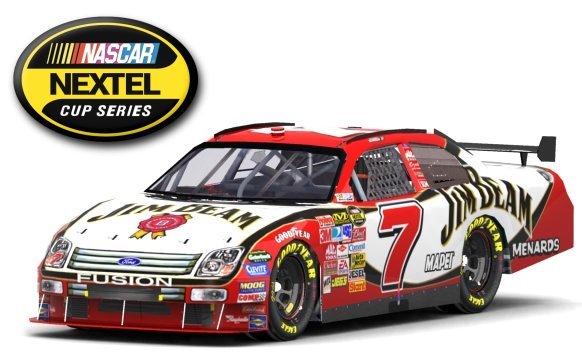 For the 2008 racing season, Camping World and Robby Gordon Motorsports entered into another sponsorship agreement where “Camping World agreed to provide two motor coaches and pay [Gordon] $200,000 per race for primary car sponsorship for four NASCAR Sprint Cup races.” The complaint alleges that Camping world has partially performed its obligations by providing one of the two motor coaches, but is now refusing to provide the second motor coach. The complaint continues that Camping World sought to renege the sponsorship agreement by demanding that Robby Gordon “ensure that Camping World’s colors and logos do not appear on [Gordon’s] car…and Gordon does not have [Camping World’s] permission to bear [Camping World’s] trademarks.” Also, Camping World has allegedly failed to pay at least $250,000 due under the sponsorship agreement. Robby Gordon Motorsports requests monetary damages for the alleged breach of contract and the Court’s determination of the rights of the parties with respect to the trademarks. The case is titled Team Gordon, Inc. v. Camping World, Inc., CV08-01731 MMM (C.D. California).
For the 2008 racing season, Camping World and Robby Gordon Motorsports entered into another sponsorship agreement where “Camping World agreed to provide two motor coaches and pay [Gordon] $200,000 per race for primary car sponsorship for four NASCAR Sprint Cup races.” The complaint alleges that Camping world has partially performed its obligations by providing one of the two motor coaches, but is now refusing to provide the second motor coach. The complaint continues that Camping World sought to renege the sponsorship agreement by demanding that Robby Gordon “ensure that Camping World’s colors and logos do not appear on [Gordon’s] car…and Gordon does not have [Camping World’s] permission to bear [Camping World’s] trademarks.” Also, Camping World has allegedly failed to pay at least $250,000 due under the sponsorship agreement. Robby Gordon Motorsports requests monetary damages for the alleged breach of contract and the Court’s determination of the rights of the parties with respect to the trademarks. The case is titled Team Gordon, Inc. v. Camping World, Inc., CV08-01731 MMM (C.D. California).
 Los Angeles Intellectual Property Trademark Attorney Blog
Los Angeles Intellectual Property Trademark Attorney Blog


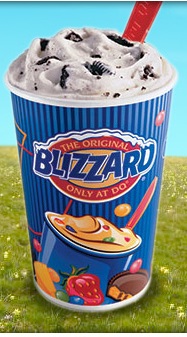 The complaint continues that the franchisee must also agree to allow Dairy Queen to audit the financial records to determine whether the proper amount of the licensing fee is being paid. If any of these franchising terms were not met and cured, it would constitute a default and the franchise rights would be terminated. After termination, the franchisee would agree to immediately cease the use and display of all of Dairy Queen’s trademarks. The terminated franchisee would also need to pay a termination fee to compensate Dairy Queen for the early termination of the franchising agreement. The complaint alleges that defendant Lee failed to comply with the upkeep standards set by Dairy Queen for its franchisee’s location and was given 60 days to correct the deficiencies, which went uncorrected. The complaint also alleges that, after an audit, it was determined that Lee underpaid Dairy Queen by $16,911.84, which Lee failed to pay after receiving notice. The complaint alleges the following causes of action: (1) Trademark infringement of USPTO registered trademarks; (2) False designation of origin under the Lanham Act 43(a) (15 U.S.C. 1125(a)); (3) Federal trademark dilution of famous trademarks under the Lanham Act 43(c) (15 U.S.C. 1125(c)); (4) Trademark counterfeiting; and (5) Breach of contract. The case is titled American Dairy Queen Corporation and DQF, Inc., v. Myung Taek Lee, CV08-01505 AHM (C.D. California).
The complaint continues that the franchisee must also agree to allow Dairy Queen to audit the financial records to determine whether the proper amount of the licensing fee is being paid. If any of these franchising terms were not met and cured, it would constitute a default and the franchise rights would be terminated. After termination, the franchisee would agree to immediately cease the use and display of all of Dairy Queen’s trademarks. The terminated franchisee would also need to pay a termination fee to compensate Dairy Queen for the early termination of the franchising agreement. The complaint alleges that defendant Lee failed to comply with the upkeep standards set by Dairy Queen for its franchisee’s location and was given 60 days to correct the deficiencies, which went uncorrected. The complaint also alleges that, after an audit, it was determined that Lee underpaid Dairy Queen by $16,911.84, which Lee failed to pay after receiving notice. The complaint alleges the following causes of action: (1) Trademark infringement of USPTO registered trademarks; (2) False designation of origin under the Lanham Act 43(a) (15 U.S.C. 1125(a)); (3) Federal trademark dilution of famous trademarks under the Lanham Act 43(c) (15 U.S.C. 1125(c)); (4) Trademark counterfeiting; and (5) Breach of contract. The case is titled American Dairy Queen Corporation and DQF, Inc., v. Myung Taek Lee, CV08-01505 AHM (C.D. California). Plaintiff alleges that “Defendant adopted and began using the Newport Dental Group mark with actual or constructive knowledge of [Plaintiff’s] prior use and application to register the Newport Dental Marks, and with the intent to trade on the goodwill and reputation of the Newport Dental Marks. Defendant’s use of the Newport Dental Group trademark, the complaint alleges, “is likely to lead to lead consumers to erroneously believe that Defendant’s services originate from or are otherwise sponsored by, approved by, or affiliated with the owner of the Newport Dental” trademarks. In addition to preliminary and permanent injunctions, Plaintiff seeks monetary damages and attorneys’ fees as a result of the Defendant’s alleged trademark infringement. The case is titled Bright Now! Dental, Inc., v. Newport Dental Group, SACV08-00223 JVS (C.D. California).
Plaintiff alleges that “Defendant adopted and began using the Newport Dental Group mark with actual or constructive knowledge of [Plaintiff’s] prior use and application to register the Newport Dental Marks, and with the intent to trade on the goodwill and reputation of the Newport Dental Marks. Defendant’s use of the Newport Dental Group trademark, the complaint alleges, “is likely to lead to lead consumers to erroneously believe that Defendant’s services originate from or are otherwise sponsored by, approved by, or affiliated with the owner of the Newport Dental” trademarks. In addition to preliminary and permanent injunctions, Plaintiff seeks monetary damages and attorneys’ fees as a result of the Defendant’s alleged trademark infringement. The case is titled Bright Now! Dental, Inc., v. Newport Dental Group, SACV08-00223 JVS (C.D. California). Plaintiff alleges that several defendants are infringing its patent by making, selling, and using undulating figure products embodying the patented invention. Plaintiff also states that defendants are infringing on its “Fly Guy” trademark by using the confusingly similar “Fly Guys” trademark. In addition, Plaintiff contends that the defendants are using its “Fly Guy” trademark as a Google adword to redirect consumers to defendants’ websites. The complaint asserts causes of action for infringement; federal trademark infringement of registered trademark (15 U.S.C. §§ 1114-1117; Lanham Act § 32); federal unfair competition (false designation of origin and false description (Lanham Act 43(a) and 15 U.S.C. 1125); trademark infringement under California law; California unfair competition under section 17200; and trademark dilution. Plaintiff alleges that the infringement is willful and intentional and requests that the damages be trebled. The case is titled Air Dimensional, Inc., v. Action Sky Dancers, CV08-01121 GW (C.D. California).
Plaintiff alleges that several defendants are infringing its patent by making, selling, and using undulating figure products embodying the patented invention. Plaintiff also states that defendants are infringing on its “Fly Guy” trademark by using the confusingly similar “Fly Guys” trademark. In addition, Plaintiff contends that the defendants are using its “Fly Guy” trademark as a Google adword to redirect consumers to defendants’ websites. The complaint asserts causes of action for infringement; federal trademark infringement of registered trademark (15 U.S.C. §§ 1114-1117; Lanham Act § 32); federal unfair competition (false designation of origin and false description (Lanham Act 43(a) and 15 U.S.C. 1125); trademark infringement under California law; California unfair competition under section 17200; and trademark dilution. Plaintiff alleges that the infringement is willful and intentional and requests that the damages be trebled. The case is titled Air Dimensional, Inc., v. Action Sky Dancers, CV08-01121 GW (C.D. California).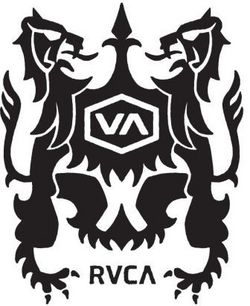
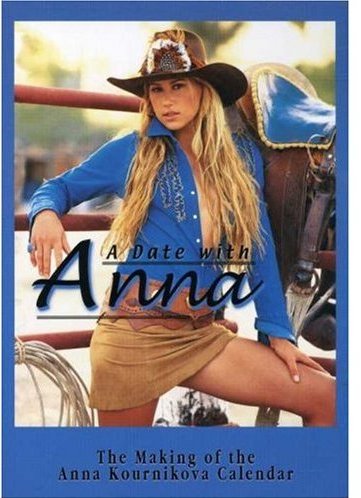 In February of 2006, Swann purchased a DVD of “A Date With Anna” and discovered that twenty two minutes of his copyrighted music was used in Kournikova’s DVD. Swann alleges that because he expressly rejected the licensing agreement offer, no agreement was ever reached and the use of the copyrighted material without license, or other consideration constitutes copyright infringement. Swann alleges that “as early as April 2003, defendants, and each of them, without Plaintiff’s permission, license, and without remuneration to Plaintiff, adapted, used, reproduced, marketed, distributed and sold Plaintiff’s copyrighted material in the defendants’ video production, a digital video disc (DVD) entitled, ‘A DATE WITH ANNA.'” Swann continues that the infringement by the defendants was intentional and knowing and seeks preliminary and permanent injunctions against the distribution of the video. The case is titled Christopher Jerry Swann v. Anna Kournikova et al., CV08-01477 R (C.D. California).
In February of 2006, Swann purchased a DVD of “A Date With Anna” and discovered that twenty two minutes of his copyrighted music was used in Kournikova’s DVD. Swann alleges that because he expressly rejected the licensing agreement offer, no agreement was ever reached and the use of the copyrighted material without license, or other consideration constitutes copyright infringement. Swann alleges that “as early as April 2003, defendants, and each of them, without Plaintiff’s permission, license, and without remuneration to Plaintiff, adapted, used, reproduced, marketed, distributed and sold Plaintiff’s copyrighted material in the defendants’ video production, a digital video disc (DVD) entitled, ‘A DATE WITH ANNA.'” Swann continues that the infringement by the defendants was intentional and knowing and seeks preliminary and permanent injunctions against the distribution of the video. The case is titled Christopher Jerry Swann v. Anna Kournikova et al., CV08-01477 R (C.D. California).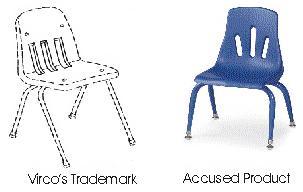 Virco alleges that in late 2007, it discovered that defendant “was manufacturing, selling, advertising, and distributing two versions of a children’s plastic chair that used [Virco three slot design trademark]. The goods sold by defendants are confusingly similar copies of the [Virco’s trademark].” Virco continues that defendant’s use of the three slot trademark “creates a likelihood that Plaintiff’s customers, potential customers, members of the trade, and the public generally will be misled as to the source of goods or services in that they are likely to believe that Defendant’s business and products are affiliated with or sponsored by Plaintiffs. The complaint sets forth the following seven causes of action: (1) Registered trademark infringement, (2) False designation of origin 15 U.S.C. 1125, (3) Trade dress infringement, (4) Common law trademark infringement, (5) Common law unfair competition, (6) Statutory unfair competition, § 17200, (7) Trademark Dilution. The case is titled Virco MFG. Corp, v. Jonti-Craft, Inc., CV08-01332 PSG (C.D. California).
Virco alleges that in late 2007, it discovered that defendant “was manufacturing, selling, advertising, and distributing two versions of a children’s plastic chair that used [Virco three slot design trademark]. The goods sold by defendants are confusingly similar copies of the [Virco’s trademark].” Virco continues that defendant’s use of the three slot trademark “creates a likelihood that Plaintiff’s customers, potential customers, members of the trade, and the public generally will be misled as to the source of goods or services in that they are likely to believe that Defendant’s business and products are affiliated with or sponsored by Plaintiffs. The complaint sets forth the following seven causes of action: (1) Registered trademark infringement, (2) False designation of origin 15 U.S.C. 1125, (3) Trade dress infringement, (4) Common law trademark infringement, (5) Common law unfair competition, (6) Statutory unfair competition, § 17200, (7) Trademark Dilution. The case is titled Virco MFG. Corp, v. Jonti-Craft, Inc., CV08-01332 PSG (C.D. California).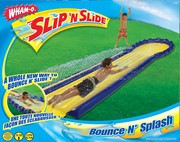 In a newly filed trademark infringement, trademark dilution, false advertising, unfair competition (17200), contributory infringement, contributory trademark dilution, and judgment debtor’s interest (Cal. Civ. Proc. Code § 708.210) lawsuit, Wham-O alleges that SLB Toys initiated an elaborate scheme designed to evade judgment and deprive Wham-O of its monetary award through an assignment for benefit of creditors. Wham-O alleges that the individual defendants, who were officers of the defendant SLB Toys, have “flagrantly disregarded the terms of this Court’s injunction by continuing to sell and distribute to retailers unauthorized slides bearing” the yellow waterslide trademark and to advertise the same. Wham-O asserts that SLB Toys was merely an undercapitalized shell corporation that failed to follow corporate formalities and the individual officers and other companies which are owned by the officers are SLB Toys’ alter egos.
In a newly filed trademark infringement, trademark dilution, false advertising, unfair competition (17200), contributory infringement, contributory trademark dilution, and judgment debtor’s interest (Cal. Civ. Proc. Code § 708.210) lawsuit, Wham-O alleges that SLB Toys initiated an elaborate scheme designed to evade judgment and deprive Wham-O of its monetary award through an assignment for benefit of creditors. Wham-O alleges that the individual defendants, who were officers of the defendant SLB Toys, have “flagrantly disregarded the terms of this Court’s injunction by continuing to sell and distribute to retailers unauthorized slides bearing” the yellow waterslide trademark and to advertise the same. Wham-O asserts that SLB Toys was merely an undercapitalized shell corporation that failed to follow corporate formalities and the individual officers and other companies which are owned by the officers are SLB Toys’ alter egos. King Tuna alleges that competing Defendants use “chemical CO” to treat their tuna during transport and not “filtered wood smoke.” Thus, plaintiff alleges that defendants’ filtered wood smoke “labeling is literally false as in actual practice and likely to mislead customers, as [defendants] misrepresent the nature, characteristics and qualities of its tuna products by presenting its raw tuna products as treated with filtered wood smoke and not chemical CO.” Plaintiff alleges that such mislabeling violates the Lanham Act because it constitutes misrepresentation in commercial advertising, which is likely to influence purchasing decisions of consumers. Also, as the complaint alleges, by mislabeling their products, defendants are engaging in unlawful business practices and unfair competition in violation of Cal. Bus. & Prof. Code § 17200.
King Tuna alleges that competing Defendants use “chemical CO” to treat their tuna during transport and not “filtered wood smoke.” Thus, plaintiff alleges that defendants’ filtered wood smoke “labeling is literally false as in actual practice and likely to mislead customers, as [defendants] misrepresent the nature, characteristics and qualities of its tuna products by presenting its raw tuna products as treated with filtered wood smoke and not chemical CO.” Plaintiff alleges that such mislabeling violates the Lanham Act because it constitutes misrepresentation in commercial advertising, which is likely to influence purchasing decisions of consumers. Also, as the complaint alleges, by mislabeling their products, defendants are engaging in unlawful business practices and unfair competition in violation of Cal. Bus. & Prof. Code § 17200.